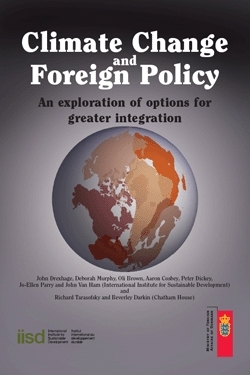Climate Change and Foreign Policy: Forward
Climate Change and Foreign Policy: An exploration of options for greater integration reflects a change in strategic thinking. It presents a series of recommendations on how foreign policy can help to foster international cooperation on climate change action. This opens up a broad array of new opportunities, because climate change is intimately connected with a wider social, economic and geopolitical agenda.
The message of this report is clear: an integrated climate change–foreign policy approach has the potential to improve prospects for more effective efforts to address climate change at the national and international level. Looking at the key foreign policy areas of the Ministry of Foreign Affairs of Denmark, we identified a number of opportunities to advance climate change objectives. The areas of diplomacy and foreign relations, energy security, peace and security, trade and investment and development cooperation all involve domestic and international policies that could fundamentally alter the ability and willingness of nations and the international community to meet the challenges of climate change.
This research represents IISD’s first major attempt to position climate change in the broader foreign policy context. It has been a useful exercise from IISD’s perspective, allowing us to bring together experts from our Trade and Investment; Security; and our Climate Change and Energy groups. In the process, we developed a greater sensitivity to the range of options available that would tackle climate change more effectively by involving a wider and more influential constituency.
I would like to thank the IISD team for their work and for the quality of their efforts—in particular, John Drexhage, Deborah Murphy, Oli Brown, Aaron Cosbey, Peter Dickey, Jo-Ellen Parry and John Van Ham. I would also like to thank Chatham House, in particular Richard Tarasofsky and Beverley Darkin, who led the analysis on international diplomacy and relations, and provided input on the report as a whole.
IISD believes that this research is only a first step in bringing these complex issues together. We are keen to continue our work in this area; in particular, by examining linkages between climate change and economic development plans and programs in developed countries, and furthering analysis in specific areas of foreign policy, such as trade and investment, and security. The results of this work could provide valuable inputs for climate change policy at the national and global levels.
I would like to thank the Ministry of Foreign Affairs of Denmark who funded this exercise. The publication is the latest in a series we have produced in cooperation with the Ministry examining some of the major challenges facing sustainable development. The earlier titles are Global Environmental Governance: A Reform Agenda and Environment and Globalization: Five Propositions.
David Runnalls
President and Chief Executive Officer
International Institute for Sustainable Development
|
|
